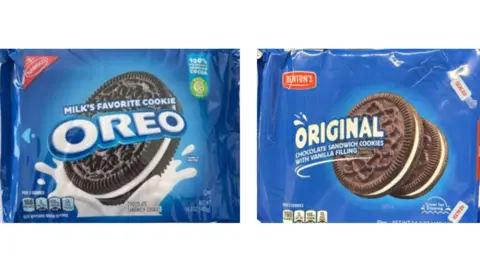In a recent legal development, Mondelēz International, the company renowned for its popular Oreo snack brand, has launched a lawsuit against the American discount supermarket chain Aldi. The lawsuit, filed in the United States, alleges that Aldi has engaged in “blatant” copyright infringement by mimicking the packaging of Oreos and other well-known Mondelēz products. The crux of the complaint posits that Aldi’s packaging is designed to mislead consumers, effectively capitalizing on the established allure, reputation, and prestige associated with Oreo and other Mondelēz snacks such as Wheat Thins, Nutter Butter, Chips Ahoy!, and Ritz.
Court documents reveal that the allegations extend beyond mere packaging similarities. Mondelēz asserts that the way Aldi’s products are presented is likely to deceive consumers, leading them to mistakenly believe that these budget options are affiliated with or comparable to the famous Mondelēz brands. At present, Aldi has refrained from issuing a comment to the media about the lawsuit, which reflects the company’s strategic stance in legal disputes. However, Aldi’s UK division has reiterated that while they share ownership, they operate entirely as separate entities, implying that this lawsuit does not extend to their operations across the Atlantic.
The situation reached this legal stage after Mondelēz reported having made multiple attempts to address their concerns directly with Aldi regarding what they termed “confusingly similar packaging.” Although some of Aldi’s products have undergone modifications—either through discontinuation or changes in appearance—the lawsuit claims that the retailer continues to produce items that Mondelēz deems as “unacceptable copies.” The claim asserts that allowing Aldi to persist in the production and sale of these similar products would result in “irreparable harm” to the Mondelēz brand, which has established a strong foothold in the competitive snack market.
Photographic evidence is included in the lawsuit, showcasing side-by-side comparisons between the packaging of Mondelēz products and Aldi’s alternatives. This visual evidence is pivotal in strengthening Mondelēz’s argument, highlighting the striking similarities that could mislead consumers into purchasing Aldi’s offerings under false pretenses. Alongside the accusations of trademark infringement, Mondelēz has cited unfair competition and unjust enrichment, seeking monetary damages for the alleged violations.
Aldi, which has its global headquarters in Germany, has built a reputation as a no-frills supermarket merging affordability with product variety, frequently offering private label products that are strikingly similar to popular name-brand goods. With over 2,500 locations in the United States alone, Aldi’s reach is significant; this lawsuit represents just another aspect of the ongoing struggle between established brands and discount retailers within the evolving food marketplace.
Interestingly, this is not the first time Aldi has faced accusations of copying products. Earlier this year, the supermarket chain lost a trademark dispute with Cider producers Thatchers, who alleged that their cider had been unfairly copied in taste and appearance by Aldi. This history of legal challenges raises questions about Aldi’s business practices and their implications in the eyes of both consumers and brand owners.
As the case progresses, it highlights the complex dynamics within the food industry, where brand loyalty battles against the backdrop of discount pricing strategies. The outcome of this lawsuit could set a precedent for future brand disputes, particularly as more companies grapple with protecting their intellectual property against a backdrop of increasing competition in the retail sector.











